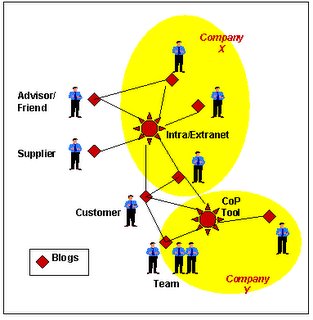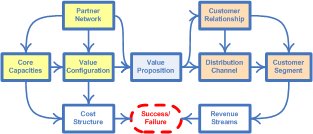What's Your Blogging Personality?
Are you The Artist, The Daily Grinder, The Patchworker, The Pundit or The Writer? Take this quiz and find out:
Blogging Personality Quiz
 In a recent post, I described Social Networking Enablement as the natural evolution of Knowledge Management:
In a recent post, I described Social Networking Enablement as the natural evolution of Knowledge Management:
Alex Osterwalder and I have been exchanging e-mails on the subject of business models. Alex's blog is devoted entirely to this subject, and the graphic above is his 'business model model', showing the nine 'building blocks' for such models from his synthesis of reading on the subject. The right side of the model is about how the business generates revenue, while the left side is about how it manages costs and hence generates profit. I've been advising clients and prospective new businesses how to document and evaluate their business model for years, and in my experience there are three types of business models, that organizations look at in sequence:
Viability Model: How the idea/project/plan/business will make money, and with which partners. In some cases it is actually about How the idea/project/plan/business will fill an untapped need, and with which partners. Such a model outlines the research that will be done to ensure the value proposition is compelling (i.e. customers want and are prepared to pay for it), that the business has, or can acquire, the competencies and resources needed to deliver it, and that it makes strategic sense for the organization (e.g. it's consistent with their mission and values and does not cannibalize existing business). This model culminates in a go/no go decision.
Formation Model: How the idea/project/plan/business will be set up. This model is focused on capital and infrastructure that must be in place before operations can begin: human capital (what people will be involved in what roles), intellectual capital (what knowledge, technology and know-how must be put in place), physical capital (what premises, equipment and supplies will be needed prior to start-up), financial capital (start-up money, and where it will come from), and social capital (organization, alliances and relationships that will drive it). This model culminates in a launch.
Operating Model: How the idea/project/plan/business will operate. This model describes the ongoing activities of the organization or project -- what megaprocesses it will entail (e.g. R&D, purchasing, sales & marketing, manufacturing, distribution, service, back office support, and management decision making), what budgets and other resources it will require and use, and what roles will be played by who.





Web Logs 101: Blogging for Beginners: Lesson 3: Writing and Publishing Weblogs
3.1 - Writing Your First Blog Entry 3.2 - What To Blog 3.3 - Keeping Blog Ideas Flowing 3.4 - Effective Blogging 3.5 - Blogs and Copyright Laws Discuss or Ask About This Lesson
from Sheila Ann Manuel CogginsHello. Your third lesson is now here and it looks in to what it really means to start blogging. Just remember that in order to read the sections of this lesson in full, you must click on the appropriate titles and you need to be online to do this. Visit the forums if you wish to ask or to share something about your blog writing and publishing experiences. Have fun!
3.1 - Writing Your First Blog Entry
7 Tips and Ideas for Your First Weblog Entry
Your blog is now set up and ready. Great! Now, you just need some ideas on the best way to start blogging. The first advice: Just write something. Anything, really. Read on for more tips.
3.2 - What To Blog
What Do You Blog About?
OK. You've got a blog and you already wrote your first entry. What's next? Depending on the type of blog you wish to maintain, you can come up with different types of content. This part of the lesson gives you more guidelines and ideas.
3.3 - Keeping Blog Ideas Flowing
10 Ways To Create Content For Your Weblog
If you're struggling for more blogging ideas, this piece should help you beat your blogger's block. Some tips: Check Your Inbox, Start Blog Hopping, and Create Lists.
3.4 - Effective Blogging
6 Time Management Tips for Bloggers
Many bloggers find it overwhelming to keep up with blogging. In this section of the lesson, you will find some advice on how to manage your time as a blogger more effectively.
3.5 - Blogs and Copyright Laws
4 Basic Questions About Copyright and Weblogs
When you start blogging, you're creating content. That is why it is important to make sure that you know the laws regarding linking, quoting, and posting other content. Make sure you also read the 14 Copyright Tips For Bloggers.